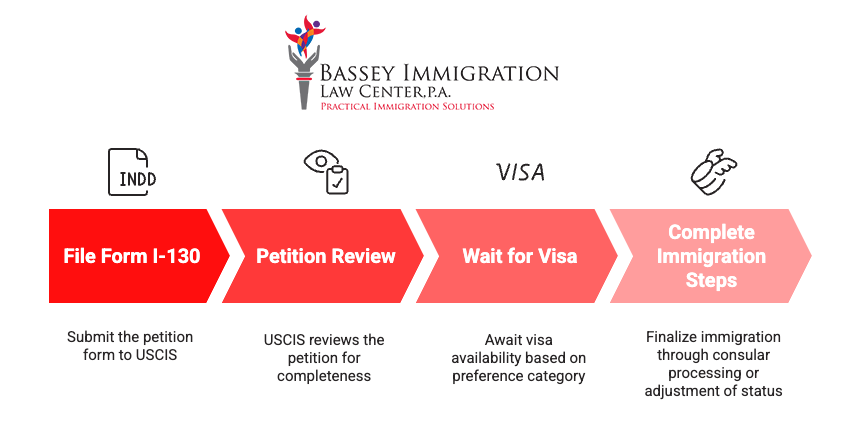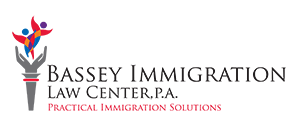How Can I Sponsor A Family Member For U.S. Immigration?
To sponsor a family member for U.S. immigration, you must initiate the process by filing Form I-130, Petition for Alien Relative, with U.S. Citizenship and Immigration Services (USCIS). You must also meet specific eligibility requirements and submit evidence of your legal status in the United States, along with proof of your financial ability to support your relative, typically through an Affidavit of Support.
At Bassey Immigration Law Center P.A., our team has been through the immigrant process and knows what you need to do to be successful. We have over two decades of experience helping people through the system and can help you face immigration challenges. Schedule an affordable consultation to get started.
Who Can I Sponsor?
If you are a U.S. citizen, you may sponsor:
- Your spouse
- Your unmarried children under 21
- Your married or unmarried sons and daughters over 21
- Your parents (if you’re at least 21)
- Your brothers and sisters (if you are at least 21)
If you are a lawful permanent resident, you may sponsor:
- Your spouse
- Your unmarried children (of any age)
Note: Each qualifying family relationship is treated distinctly under U.S. immigration law. Certain relatives, such as spouses, unmarried minor children, and parents of U.S. citizens, are classified as immediate relatives and are not subject to annual visa caps. Others fall into family preference categories, subject to numerical limits and varying wait times based on the relationship and the beneficiary’s country of origin.
Our attorneys guide clients through the complexities of obtaining a spousal visa or other family-based visas, ensuring the proper procedures are followed for each unique case.
What Is the Sponsorship Process?

To sponsor a family member, you must submit a petition and provide documentation that proves the relationship.
Here is an overview of the process:
Step 1: File Form I-130
Begin the sponsorship process by submitting Form I-130, Petition for Alien Relative, to the U.S. Citizenship and Immigration Services (USCIS). This form establishes a qualifying family relationship between you, the petitioner, and the relative you intend to sponsor.
Form I-130 may be filed online through a USCIS account or by mail to the appropriate USCIS service center, depending on your location and the beneficiary’s circumstances. Completing this form and including all required supporting documentation is essential to avoid delays or denials in the petition process.
Supporting documentation typically includes:
- Proof of your U.S. citizenship or lawful permanent resident status. For example, a U.S. passport, naturalization certificate, or green card.
- Evidence of the qualifying family relationship. For example, birth certificate, marriage certificate, or adoption records.
- The required filing fee is currently $535, but always verify the latest fee on the USCIS Fee Schedule.
- Additional supporting evidence, such as affidavits of relationship, photographs, joint financial records, or travel history, depending on the nature of the relationship and the specific facts of the case
It’s important to tailor the supporting documents to the relationship type and USCIS requirements to strengthen the petition.
Step 2: Petition Review
After you submit Form I-130, USCIS will review the petition for completeness and eligibility. If necessary, it may issue a Request for Evidence (RFE) to obtain missing or clarifying documentation.
Upon approval, the case is forwarded to the National Visa Center (NVC) for consular processing if the beneficiary is outside the United States. If the beneficiary is lawfully present in the U.S. and eligible, the case may proceed with an Adjustment of Status through USCIS.
Step 3: Wait for a Visa to Become Available
If your relative falls under a family preference category, visa availability is subject to annual numerical limits and priority dates established in the U.S. Department of State’s Visa Bulletin.
You must wait until a visa number becomes available before proceeding to the next step. Immediate relatives of U.S. citizens, such as spouses, unmarried children under 21, and parents, are not subject to these limits and may proceed without a wait once the I-130 is approved.
Step 4: Complete Final Immigration Steps
Once a visa becomes available, your relative may complete the immigration process through one of two pathways:
- Consular Processing, which involves attending an immigrant visa interview at a U.S. embassy or consulate abroad, or
- Adjustment of Status, by filing Form I-485 with USCIS while lawfully present in the United States.
In either case, you, the petitioner, must submit Form I-864, Affidavit of Support, demonstrating that you, or a qualifying joint sponsor, have sufficient income or assets to financially support the intending immigrant and prevent them from becoming a public charge.
Schedule a Consultation Today
If you want to sponsor a family member for permanent residency, Bassey Immigration Law Center, P.A. can help streamline the process and strengthen your petition. Our experienced immigration attorneys are well-versed in handling complex family-based cases, including those involving extended wait times, prior immigration violations, or potential inadmissibility issues.
Contact our office today to schedule an affordable consultation. Whether you are filing for a spouse, child, or sibling, our team is ready to help you take the next step toward bringing your loved one home.
About Bassey Immigration Law Center, P.A.
Bassey Immigration Law Center, P.A., led by attorney Aniefiok Bassey, provides comprehensive immigration services to individuals, families, and businesses in Florida and beyond. With over 20 years of experience, the firm assists clients with a wide range of immigration matters, from family reunification and green cards to business visas and deportation defense. The diverse, multilingual team is dedicated to supporting clients through the complex immigration process, with a special focus on citizenship, asylum, and LGBTQ+ immigration needs. They offer affordable initial consultations and are committed to delivering personalized, strategic guidance for achieving clients’ immigration goals.



